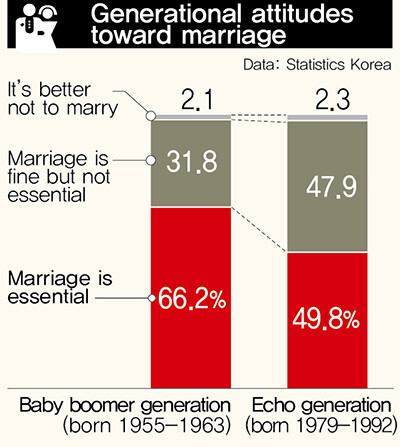hankyoreh
Links to other country sites 다른 나라 사이트 링크
Just half of younger generation says marriage is “necessary”

Just half of South Korea’s so-called “echo generation” believes marriage is necessary, a recent study finds.
The echo generation is the segment born between 1979 and 1992 to parents from the Baby Boom generation born between 1955 and 1963.
A report on South Korean social trends in 2015 published by Statistics Korea on Dec. 10 showed 49.8% of respondents from the echo generation answering that marriage was “essential” or “a good idea.”
The numbers show a sharp generational contrast in marriage attitudes with their parents in the Baby Boom generation, 66.2% of whom gave the same answers - a difference of 16.4 percentage points.
The “neutral” position that marriage is “fine but not essential” was given by 47.9% of echo generation respondents and 31.8% of boomers. The response of “it’s better not to marry” was given at similar rates, with 2.3% of echo generation respondents and 2.1% of boomer respondents agreeing.
The echo generation is currently seen as the key segment poised to lead South Korea in terms of age and proportion of the total population (19.9%). Its name refers to the re-emergence of high childbirth rates decades later in a second-generation baby boom.
Generational differences were also visible on the issue of cohabitation, with 65.6% of boomers opposing the idea of unmarried couples living together and 61.9% of echo generation members expressing approval.
“The younger the generation is, the more we see the attitude that marriage isn’t necessary and acceptance of unmarried men and women living together,” Statistics Korea said.
In terms of division of housework duties, 59.4% of boomers answer that they were the woman’s responsibility, while 59.3% of echo generation members said they should be divided fairly.
Echo generation respondents were also more than twice as likely than boomers to show progressive beliefs. Among boomer respondents, 43.8% identified themselves as conservative and 14.6% as progressive, while 29.5% of echo generation respondents identified as progressive and 19.7% as conservative.
Meanwhile, the South Korean government announced plans to offer 135,000 units of housing to newlyweds and young couples and create 370,000 jobs for young people as part of a strategy to address the country’s low birth rate and aging population trend. The program will entail spending of an additional 34 trillion won (US$28.8 billion) above the existing budget for low birth rate and aging population measures.
A third framework plan on the issue was reviewed and approved at a meeting of the Presidential Committee on Ageing Society and Population Policy chaired by President Park Geun-hye at the Blue House on Dec. 10. While the previous two framework plans had chiefly involved measures to reduce the childcare burden on existing married households, the focus of the latest is on resolving the employment and housing issues that cause younger people to put off or opt against marriage, the administration explained.
“The biggest reason for the late marriage phenomenon is the fact that young people do not have proper employment,” Park said at the meeting.
“They aren’t able to consider marriage because they have no income and their employment prospects are uncertain,” she explained.
South Korea’s birth rate for 2014 stood at 1.21, one of the lowest in the world and far below the 1.7 average for Organization of Economic Co-operation and Development (OECD) member countries.
By Kim So-youn, staff reporter
Please direct questions or comments to [english@hani.co.kr]

Editorial・opinion
![[Editorial] Intensifying US-China rivalry means Seoul must address uncertainty with Beijing sooner than later [Editorial] Intensifying US-China rivalry means Seoul must address uncertainty with Beijing sooner than later](https://flexible.img.hani.co.kr/flexible/normal/500/300/imgdb/original/2024/0517/8117159322045222.jpg) [Editorial] Intensifying US-China rivalry means Seoul must address uncertainty with Beijing sooner than later
[Editorial] Intensifying US-China rivalry means Seoul must address uncertainty with Beijing sooner than later![[Column] When ‘fairness’ means hate and violence [Column] When ‘fairness’ means hate and violence](https://flexible.img.hani.co.kr/flexible/normal/500/300/imgdb/original/2024/0516/7417158465908824.jpg) [Column] When ‘fairness’ means hate and violence
[Column] When ‘fairness’ means hate and violence- [Editorial] Yoon must stop abusing authority to shield himself from investigation
- [Column] US troop withdrawal from Korea could be the Acheson Line all over
- [Column] How to win back readers who’ve turned to YouTube for news
- [Column] Welcome to the president’s pity party
- [Editorial] Korea must respond firmly to Japan’s attempt to usurp Line
- [Editorial] Transfers of prosecutors investigating Korea’s first lady send chilling message
- [Column] Will Seoul’s ties with Moscow really recover on their own?
- [Column] Samsung’s ‘lost decade’ and Lee Jae-yong’s mismatched chopsticks
Most viewed articles
- 1For new generation of Chinese artists, discontent is disobedience
- 2[Editorial] Transfers of prosecutors investigating Korea’s first lady send chilling message
- 3[Exclusive] Unearthed memo suggests Gwangju Uprising missing may have been cremated
- 4[Editorial] Intensifying US-China rivalry means Seoul must address uncertainty with Beijing sooner t
- 5S. Korea “monitoring developments” after report of secret Chinese police station in Seoul
- 6N. Korean media upgrades epithet for leader’s daughter from “beloved” to “respected”
- 7Yoon says concern about biased diplomacy is being incited by “communist totalitarian forces”
- 8[Column] US troop withdrawal from Korea could be the Acheson Line all over
- 9Xi, Putin ‘oppose acts of military intimidation’ against N. Korea by US in joint statement
- 1060% of young Koreans see no need to have kids after marriage